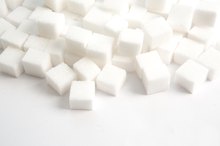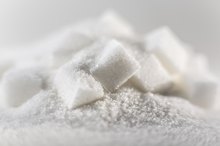How Does Glucose Move into a Cell?
Eat a bowl of cereal or a piece of fruit and your body will convert the carbohydrates in your meal to glucose--the form of sugar cells in the body rely on for quick energy. Glucose circulates through the blood stream, powering your muscles, organs, and brain. But how exactly does your body use glucose?
The Transporters
Your body relies on molecules called glucose transporters (GLUT is the scientific term) to deliver the sugar to cells. GLUT molecules tend to specialize: GLUT2, for example, delivers glucose to the digestive tract, liver, and pancreas; GLUT3 keeps the central nervous system and the brain running; GLUT4 serves the heart, muscles and fat cells. And GLUT1? It's a general transporter that can fill in where needed.
- Your body relies on molecules called glucose transporters (GLUT is the scientific term) to deliver the sugar to cells.
Binding
Is Glucose Stored in the Human Body?
Learn More
When cells require energy, the GLUT molecule on the cell's surface will bind with blood glucose and usher it into the cell. After reaching the inside of the cell, the cells machinery converts the sugar into energy.
Insulin
You've probably heard about the hormone insulin in connection with blood sugar before: After all, many people with diabetes rely on insulin shots to help control their blood sugar. Insulin primarily assists GLUT4--the transporter that serves muscle and fat cells 2. Insulin can boost the number of transponders on fat cells especially, and it can increase the rate at which fat cells' transponders bind with sugar. When you have high levels of glucose in the blood, insulin can urge fat cells to absorb the excess sugar and store it as fat.
- You've probably heard about the hormone insulin in connection with blood sugar before: After all, many people with diabetes rely on insulin shots to help control their blood sugar.
- When you have high levels of glucose in the blood, insulin can urge fat cells to absorb the excess sugar and store it as fat.
The Hazard of too Much Sugar
Foods Containing Glucose or Fructose
Learn More
People who overeat carbohydrate-rich foods like breads, pasta, and cereal or regularly down colas and other sweet drinks, can overtax the body's ability to process glucose. The pancreas--which produces insulin--can fail to secrete enough of the hormone to meet the body's needs. Insulin-resistance is another danger: Glucose transporters--especially GLUT4--can fail to respond to to insulin's message to process more glucose. A failing pancreas and insulin-resistance can lead to diabetes--which is why it's so important to limit the amount of sugar in your diet.
- People who overeat carbohydrate-rich foods like breads, pasta, and cereal or regularly down colas and other sweet drinks, can overtax the body's ability to process glucose.
- The pancreas--which produces insulin--can fail to secrete enough of the hormone to meet the body's needs.
Related Articles
References
- Medscape: Regulation of Glucose Uptake
- APS Physiological Reviews: Exercise, GLUT4, and Skeletal Muscle Uptake
- U.S. Centers for Disease Control and Prevention. Insulin resistance and diabetes. Last reviewed August 12, 2019.
- Wilcox G. Insulin and insulin resistance. Clin Biochem Rev. 2005;26(2):19–39.
- Ritchie RH, Zerenturk EJ, Prakoso D, Calkin AC. Lipid metabolism and its implications for type 1 diabetes-associated cardiomyopathy. J Mol Endocrinol. 2017 May;58(4):R225-R240. doi:10.1530/JME-16-0249
- Volpi, E. and Dickinson, J.M. (2015). Protein metabolism in health and diabetes. In International Textbook of Diabetes Mellitus (eds R.A. DeFronzo, E. Ferrannini, P. Zimmet and K.G.M.M. Alberti). doi:10.1002/9781118387658.ch16
- Colorado State University. Pathophysiology of the Endocrine System. Physiologic effects of insulin.
- University of Berkley, California. Endocrine Pancreas.
Resources
Writer Bio
Adam Cloe has been published in various scientific journals, including the "Journal of Biochemistry." He is currently a pathology resident at the University of Chicago. Cloe holds a Bachelor of Arts in biochemistry from Boston University, a M.D. from the University of Chicago and a Ph.D. in pathology from the University of Chicago.









